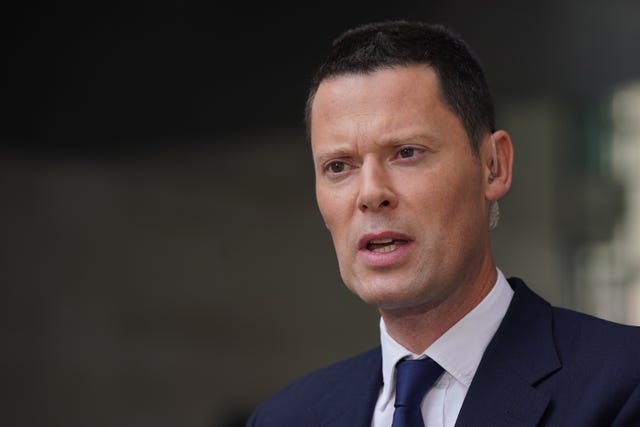
Rishi Sunak was facing pressure to designate China a threat to national security after a parliamentary researcher was arrested in Edinburgh on suspicion of spying for Beijing.
The arrest under the Official Secrets Act led to the Prime Minister confronting Chinese premier Li Qiang at the G20 summit in India on Sunday over “unacceptable” interference in democracy.
The researcher, who had links with senior Tories including security minister Tom Tugendhat and Foreign Affairs Committee chair Alicia Kearns, was arrested back in March – but it went undisclosed until Saturday.
Home Secretary Suella Braverman and Mr Tugendhat are pushing for China to be relabelled as a threat to Britain’s safety and interests under new national security laws, the Times reported.
Anyone working “at the direction” of China or a state-linked firm would have to register and disclose their activities or risk jail under the plans.
Representatives for Ms Braverman and Mr Tugendhat have not responded to requests for comment.
READ MORE: Rishi Sunak expresses 'concerns' over China spying allegations
Sir Iain Duncan Smith, the former party leader who has been sanctioned by Beijing, was among Tories pressing the Prime Minister to strengthen his language towards China.
He hit out at the “weak” position of not labelling China a threat, telling the PA news agency: “The result is that China is penetrating all our institutions from universities to Parliament.
 Tom Tugendhat is said not to have had any contact with the arrested researcher since before he became security minister last September (Danny Lawson/PA)
Tom Tugendhat is said not to have had any contact with the arrested researcher since before he became security minister last September (Danny Lawson/PA)
“Time to speak through strength not weakness.”
Mr Sunak cited his confrontation with Mr Li in New Delhi as an example of the benefits of his policy of engagement rather than “shouting from the sidelines”.
The Prime Minister told broadcasters that he raised his “very strong concerns about any interference in our parliamentary democracy, which is obviously unacceptable”.
“There’s no point carping from the sidelines, I’d rather be in there directly expressing my concerns, and that’s what I did today,” he added.
Labour’s shadow business secretary Jonathan Reynolds said not describing China as a threat is “naive” but argued that economic ties with Beijing could “over the long-term be a positive thing”.
But he told the BBC’s Sunday With Laura Kuenssberg China cannot be treated the same when “when you have got these appalling and shocking allegations today”.
One of the suspects, a man in his 30s, was detained in Oxfordshire on March 13, while the other, in his 20s, was arrested in Scotland's capital, Scotland Yard said. Searches were also carried out in an east London property.
Both were held on suspicion of offences under Section 1 of the Official Secrets Act 1911, which punishes offences that are said to be “prejudicial to the safety or interests of the state”.
 Justice Secretary Alex Chalk vowed that lessons will be learned (Lucy North/PA)
Justice Secretary Alex Chalk vowed that lessons will be learned (Lucy North/PA)
They were bailed until early October.
Tobias Ellwood, the Tory MP who chairs the Commons Defence Committee, warned it is “potentially part of a wider, long-term, Chinese strategy to infiltrate Parliament”.
Mr Tugendhat is said not to have had any contact with the researcher since before he became security minister in September last year.
READ MORE: 'Secret Chinese police station' in Glasgow closed
Ms Kearns declined to comment, adding: “While I recognise the public interest, we all have a duty to ensure any work of the authorities is not jeopardised.”
A report from Parliament’s spy agency watchdog, the Intelligence and Security Committee, warned in July that Beijing is targeting the UK “prolifically and aggressively”.
Last year, MI5 issued a rare security alert, warning MPs that a suspected Chinese spy called Christine Lee had engaged in “political interference activities” on behalf of China’s ruling communist regime.
Labour MP Barry Gardiner, the former chairman of the now disbanded Chinese in Britain APPG, received more than £500,000 in donations from her before the warning.



Why are you making commenting on The Herald only available to subscribers?
It should have been a safe space for informed debate, somewhere for readers to discuss issues around the biggest stories of the day, but all too often the below the line comments on most websites have become bogged down by off-topic discussions and abuse.
heraldscotland.com is tackling this problem by allowing only subscribers to comment.
We are doing this to improve the experience for our loyal readers and we believe it will reduce the ability of trolls and troublemakers, who occasionally find their way onto our site, to abuse our journalists and readers. We also hope it will help the comments section fulfil its promise as a part of Scotland's conversation with itself.
We are lucky at The Herald. We are read by an informed, educated readership who can add their knowledge and insights to our stories.
That is invaluable.
We are making the subscriber-only change to support our valued readers, who tell us they don't want the site cluttered up with irrelevant comments, untruths and abuse.
In the past, the journalist’s job was to collect and distribute information to the audience. Technology means that readers can shape a discussion. We look forward to hearing from you on heraldscotland.com
Comments & Moderation
Readers’ comments: You are personally liable for the content of any comments you upload to this website, so please act responsibly. We do not pre-moderate or monitor readers’ comments appearing on our websites, but we do post-moderate in response to complaints we receive or otherwise when a potential problem comes to our attention. You can make a complaint by using the ‘report this post’ link . We may then apply our discretion under the user terms to amend or delete comments.
Post moderation is undertaken full-time 9am-6pm on weekdays, and on a part-time basis outwith those hours.
Read the rules hereLast Updated:
Report this comment Cancel